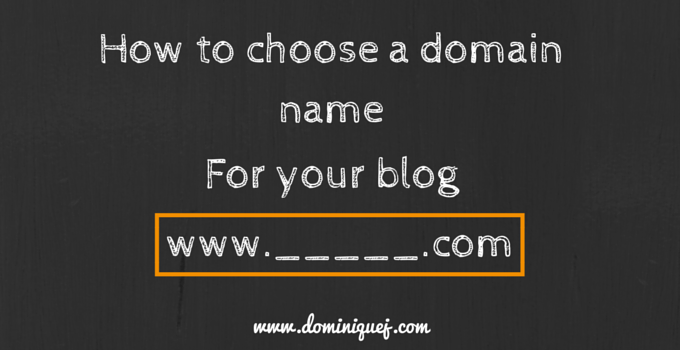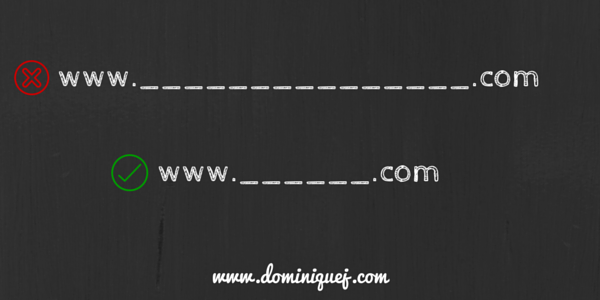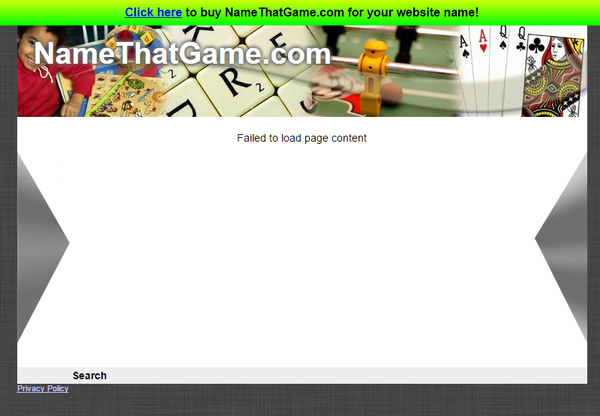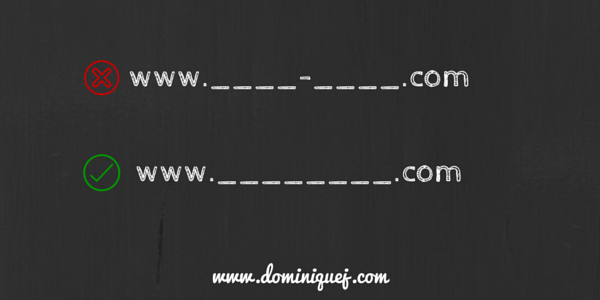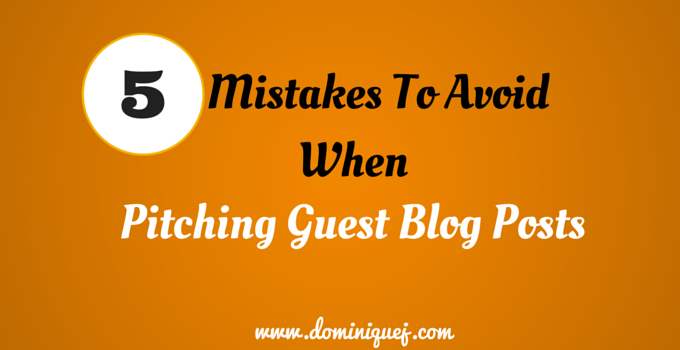Time to take it back to basics. Before you start coming up with ideas for content. Before you start writing awesome content. Before you start promoting your content. Before you start any of that stuff, you need to have a blog to put it all on. And the first step towards doing that is picking a domain name.
Choosing a domain name is kind of like naming your kid. You want it to be something that will stand the test of time, represents it well, and something that you won’t be embarrassed by 10 years from now. And just like giving your kid a bad name at birth, the older and more established your site becomes, the harder it is to change names later on. So get it right from the start.
These tips will help you avoid common mistakes when it’s time to choose the domain name for your blog.
1. Make it easy to type
This is rule number one for almost any branding or marketing person you ask about picking a domain name. But at the same time, if you’re not in the world of branding or marketing, it’s probably not something that pops up in your mind as “important” when you choose a name for your blog. Here’s an example that I always think of. Entrepreneur On Fire is my favorite podcast, and gets mentioned a lot on here. But guess what? A lot of people don’t know how to spell entrepreneur. So luckily, the owner, John Lee Dumas, was wise enough to not only register entrepreneuronfire.com, but eofire.com too, so that entrepreneurs wouldn’t have to struggle to spell entrepreneur.
Here’s my suggestion if you’re picking a domain name that might be hard to type. Try to find an abbreviated form of the domain that IS easy to type, buy it, and just forward it to your full site like John did. You can see how it works by going to eofire.com, and watch how the domain name in the address bar changes to entrepreneuronfire.com.
Being easy to type also means avoiding words that can be spelled multiple ways. Gray for instance, could be spelled grey or gray. So if your blog is graystuff.com, you’d better make sure you also buy greystuff.com too, or you’ll miss out on a lot of potential traffic.
A good way to tell if whether or not your domain name is easy to type is to see if it passes the radio test. Here’s what the test is: can a person easily type in your website after listening to a commercial on the radio and hearing your domain name mentioned?
If the answer is no, then you might want to rethink your choice.
2. Keep it short and sweet
Sometimes I wish my name was shorter, so my domain name could be fewer characters. I wouldn’t say that there’s a magic number that’s the perfect length for a domain name, but usually the shorter, the better.
Longer domain names aren’t ideal because they have a higher chance of being misspelled, and they’re harder to memorize. Imagine if instead of just Apple.com, Apple’s domain name was Applecomputerproducts.com.
Another benefit of having a shorter domain name for your blog that people tend to overlook, is that it’s better for any offline marketing and promotions you end up doing. Whether it’s putting your domain name on a business card, or putting it on promo materials, it’s a lot easier to deal with shorter domains than something that has 20 characters in it.
3. Avoid the, a, an……
Using words like “the”, “an”, “a”, or “and” is another way to make your domain names unnecessarily long, and easier to type incorrectly. A lot of people end up doing this when the domain name they originally wanted was unavailable, so they throw on a “the” or “a” to make it work.
For instance, say you wanted the domain name coolshoes.com, but it’s not available. So instead, you buy thecoolshoes.com. You’ve just added unnecessary words onto your domain just so you could have that “coolshoes” in your domain. Here’s the problem. Unless your site becomes extremely popular and you brand “the cool shoes”, people will instinctively type coolshoes.com because words like “the”, “a” and “an” are fillers/stop words in our minds.
Instead of putting these stop words in your domain, look for domains that kind of similar to what you’re after, but won’t get confused with the original. Which brings me to my next point.
4. Keep it original
I know what you’re probably thinking. With so many people buying all of the good domains, there’s barely anything unique left! But that’s not necessarily true. There are a lot of unregistered domains out there that are unique and ready for you to buy.
And when I talk about being original, I mean it shouldn’t be too similar to a site that’s already up and running and established. A lot of domain squatters make a living by buying up domains that are similar to, or common misspellings of established companies. I personally think that’s a pretty crappy thing to do. But aside from those people, don’t accidentally buy a domain name that’s similar to an existing site either.
You don’t want people confusing your site with another one. For example, Boooooom.com is a popular art blog. If I were them, I’d buy Booooom.com too, because I’ve personally mis-typed the amount of O’s in there before. If someone else were to buy Booooom.com, then they’d be able to siphon off some of their traffic.
5. Your domain name should match the title of your blog
The reason I always recommend having your domain name match your blog is for branding and consistency. It’s a little weird and confusing to tell someone your blog is called Purple People Eater but your domain name is thepurplepeopleeaters.com.
If your blog is Cool Art Stuff, then you want the domain name coolartstuff.com. This is a problem that would-be bloggers run into every day when they’re trying to come up with a name for their site. There are a bunch of domain squatters that buy extremely good domain names, and just sit on them waiting for people to pay them a ridiculous amount for it. I don’t care how badly you want the domain name, don’t feed the squatters. Unless you’re talking about a domain name like potatoes.com or something very rare along those lines, then it’s usually not worth it.
It kind of sucks to come up with an awesome name for your blog, only to find out that the domain name is already taken. It’s even worse when you type in the domain name you have your heart set on and see a page like this:
Unfortunately that’s all a part of the “game”. When that happens, a lot of people’s first instinct is to grab the .net or .org for the domain name, but I’d advise against that.
6. Get the .com
There’s some difference of opinion when it comes to this topic. Some people have no problem using a .org or .net for their site. And in some cases, it works out fine. But I recommend going with .com because it’s what most people are familiar with, and it’s the “standard” for domain names.
Some of this will depend on your industry and who you’re targeting. Even though you and I might know that there are tons of domain extensions out there beyond .com, a lot of people have no idea. If you tell them your site is cool.info, they’re going to look at you confused as hell. When it comes to branding and typeability (yup, just made that up), .com reigns supreme. Most people don’t naturally type in yoursite.org or yoursite.net. Years of browsing the internet and all of their instincts tell them that websites end in .com, so that’s what they type.
Yes, there are exceptions like non profits that use .org, or the new “trendy” companies trying to make .co popular. But for the most part, .com is where it’s at. And also, if you’re looking at .net or .org because the dot com version of your blog’s name is already taken, forget about it and just pick something else because as your site starts to grow, people will type in the dot com version of your domain name and if you don’t own it, you’re screwed.
[Tweet “How’s your domain name’s typeability? “]
7. Don’t get into legal problems
This seriously doesn’t need much explaining. Don’t buy appleproducts.com. You should avoid potential copyright issues at all costs. But in case, you can always browse copyright.gov to do a search if you think there’s a potential issue with a domain name you want to buy. Basically, just be smart about it.
8. Skip the hyphens
Hyphens are messy. And when it comes to domain names, you don’t want to deal with messiness. This is another one of those instances where being easy to type (typeability!) is important. If your site has two or three different words in it, people aren’t going to know to put a hyphen in it. For instance, if your blog is Veggie Eaters, and you choose veggie-eaters.com because veggieeaters.com was already taken, then you’re going to run into the issue of people going to the non-hyphenated version of the site instead.
If you have to use hyphens, I’d suggest just picking something else because most people don’t assume that a domain name has hyphens in it. You want to make it as simple and easy to type as humanly possible. Hyphens ain’t easy.
9. Forget the numbers
Is your site threeblindmice.com, or 3blindmice.com? That’s why you should avoid using numbers in your domain name. Going back to the radio test, people are going to have to guess how to type your domain name, which means you now have a 50/50 chance of them landing on your site.
If your blog does have a number in it, make sure you buy the domain with the number spelled out, and with the actual number in it so that nobody can take it. Just make sure that you’re only using one domain or the other. If your blog is called Three Blind Mice, make sure you’re using threeblindmice.com, and doing a 301 redirect of 3blindmice.com to threeblindmice.com. Also, anywhere you mention your blog, make sure you list it as Three Blind Mice, and not 3 Blind Mice. That’s for both branding purposes and SEO.
10. Focus on branding, not keywords
For a long time, people put a heavy emphasis on adding keywords into their domain names. The major reasoning behind it was that it provided SEO value. Some people still believe that there’s some SEO value in keyword rich domains, but I’m not convinced either way.
My opinion is that branding should be your top priority, not keywords. So a domain like buycheapshoes.com isn’t quite as effective as sneakerhouse.com when it comes to branding. Both domains do a good job of identifying the general idea of what the sites would be about, but Sneaker House would be a lot easier to brand.
I’ll even use myself as an example. For this site, I’m branding myself. Remember, you are a brand. Sure I could’ve named this site greatbloggingtips.com or something generic like that, but my goal was to have this site function as the “home” of my brand. I want people to associate my name and my blog with blogging & content marketing advice, so I use my name as my domain.
I won’t get too deep into the topic of branding here, but just make sure that you pick a domain name that really sums up your brand. Usually that means it’s your blog’s name, like I mentioned in tip #5. So when you think of what you want to name your blog, keep branding in mind.
Go Register Your Domain!
Buying a domain name can take some time. These tips should make your life a lot easier, and make sure you choose a good domain name that you won’t want to change in 10 years. If you don’t find your dream domain during the first search, don’t worry, it happens to the best of us. Just keep doing searches until you find something that works.
One of my favorite tools for helping me find good domain names is Impossibility. You put in a word that you want in your domain name, and you can choose to add adjectives, nouns or verbs to the beginning or end of the word, and the tool will show you available domain names. It’s pretty fun to play around with, and it’s extremely helpful.
How did you pick the domain name for your blog? Let me know on Twitter or drop a comment below!
